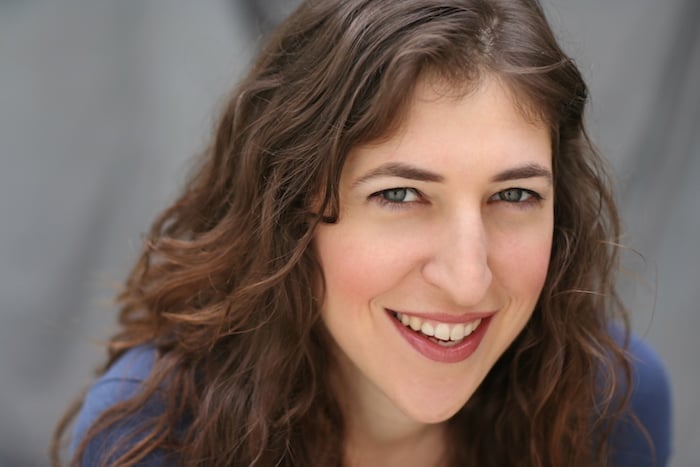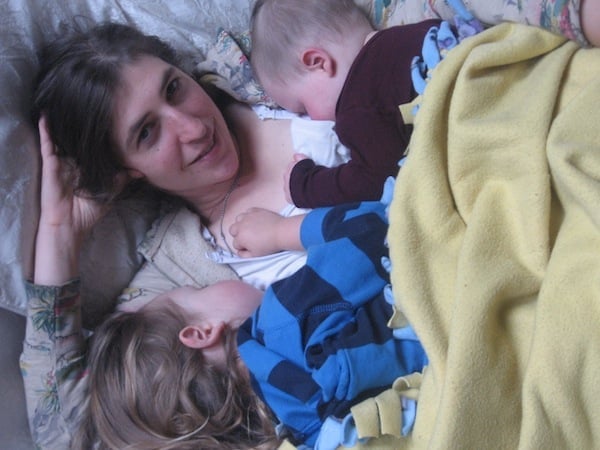Mayim Bialik On Parenting the Natural Way
To Mayim Bialik, the natural, child-led approach of Attachment Parenting not only felt right emotionally, it made sense intellectually and instinctually. It’s the philosophy Mayim has used to raise her children, Miles and Frederick.
It’s backed by science. And she should know – she’s a neuroscientist.
If you grew up watching “Blossom,” you probably always knew there was something special about Mayim Bialik. More than just smart… she seemed wise beyond her years.
Mayim continued to act, with an amazing role on The Big Bang Theory and most recently as host of Jeopardy. But what you may not know about this mother of two boys, is that she holds a PhD in Neuroscience from UCLA, is a certified lactation educator, and is a spokesperson for the Holistic Moms Network.
Her studies and work in Neuroscience led her to explore the concept of Attachment Parenting. It’s a style of parenting that focuses on creating a mutual bond between parent and child by being available, responsive, and sensitive to a child’s needs starting at birth.
Her book, Beyond the Sling: A Real-Life Guide to Raising Confident, Loving Children the Attachment Parenting Way, is a comprehensive guide to Attachment Parenting. Mayim’s perspective is honest and relatable.
This interview coincided with the publishing of her first book. In November 2012, Mayim announced her divorce from her husband Michael Stone. “After much consideration and soul-searching, Michael and I have arrived at the decision to divorce due to ‘irreconcilable differences,’” she wrote. “Divorce is terribly sad, painful and incomprehensible for children. It is not something we have decided lightly.”
Mayim and her ex-husband have stated that they amicably co-parent their sons. They’ve also been careful to keep their children’s personal lives as private as possible.
Green Child Magazine’s Attachment Parenting Interview with Mayim Bialik
It’s an educational and sometimes fascinating look inside how she and her husband are raising her two sons, ages 6 and 3, without nannies or the help of extended family. (No maids either – they divide chores and clean the house themselves.)
We spoke to Mayim about Attachment Parenting and her greatest and most challenging role so far… motherhood:
What do you think our culture would look like if more people practiced some of the principles of Attachment Parenting?
Mayim: It’s hard to say, without claiming the world would be perfect (laughs). But I think it’s safe to say we might see certain trends shift. Personally, I have faith that a culture that embraces the natural hormones during pregnancy, birth, and breastfeeding might cultivate humans that are closer to their natural nurturing states than we have now.
If the U.S. made hitting children illegal, as several dozen other countries have, we could see a huge shift in the way discipline is handled. Obviously there are long-term effects of that. Gentle discipline to me is not permissive parenting, which implies that parent and child are peers.
It’s more about communicating your needs to your child and respecting his needs at the same time. It’s using the same logic with your children as you would use with a boss, friend, or your spouse. Children aren’t stupid, and they feel valued when we treat them with respect.
Let’s talk about your thoughts on one of my favorite quotes from your book, “A green style of parenting seeks to create a generation of children who love and respect people and the earth because they have been loved and respected by their parents.”
Mayim: Being kind to the earth is one example of how you act when people are kind to you. It’s not to say that the only people who care about the earth had parents who were kind to them.
I often hear, “Oh, your kids are going to be so spoiled; the world is going to beat them up. They’re just going to expect everyone to love them. “
Yeah, I’m ok with a kid that expects everyone to love him. And when people don’t, I want my kid to wonder why, and then work towards a world where people behave kindly and with compassion.
It’s profound when people say that to me and talk about how we should sleep-train 3-month old babies because, “How are they ever going to learn to sleep alone?”
Since you bring up sleep training, you mention in the book how that pressure falls on the dad…
Mayim: It’s toying with women’s feminism to say dad can handle nighttime parenting or “cry it out” on his own. It tells a woman, “There’s nothing special about you being female; he can do all of it, too.”
We recently stopped nursing Fred at night, and it didn’t sit right with me to say, “I don’t want to deal with his crying for me at night,” and make my husband do it. In my family and in my marriage, that’s wrong.
We, of course, take turns with hard things, but my reason for making him do something that he has no more skills at than I do, just because I don’t want to do it, or because it hurts… that doesn’t work for us.
You describe your husband as a typical “guy” who also happens to be very invested in his family. He likes sports and hanging out with his buddies. Do you think there are stereotypes about what kind of dad practices Attachment Parenting?
Mayim: I know some dads who might fit a more sensitive parenting stereotype. I think they’re awesome! But my husband’s not one of them. He is masculine but not brutish, and sensitive but not passive.
Because he is now the at-home parent, it’s nice that he meets all kinds of dads in our community. I can tell you, these guys don’t sit around talking about what their wives forced them to do that morning.
For anyone that’s looking to ease into Attachment Parenting, what are some simple ways to start that make the biggest impact?
Mayim: It depends where you are in your birthing or parenting cycle. Obviously a book like mine really does a start to finish look at the API principles, with the exception of Elimination Communication, which is not part of AP.
These days we spend a lot of time and money doing a lot of things. I think going to the library and getting some basic books is really smart. The Baby Book by Dr. Sears is fantastic. Attachment Parenting International’s Attached at the Heart is excellent. (The last section of Mayim’s book lists resources she trusts.)
There’s not a formula. You don’t have to be a stay-at-home-mom to practice attachment parenting. Thankfully, there are no AP police saying, “You went back to work too early,” or, “ You didn’t breastfeed long enough.”
By and large, no matter what you choose to do with birth or feeding or sleeping, the principles of Gentle Discipline apply to every single family and I think that’s very powerful.
Someone asked me, “So you parent with no yelling?” I said, “Oh no, I’ve yelled!” But it’s not disingenuous to say that’s not something I go to.
It’s something that happens because I’m a human and not perfect. But this is the framework we start from – that just because I can yell, and I’m four feet taller, doesn’t make it ok.
Of course it’s effective. It’s terrifying to a child to be screamed at by your parents. But what is the measure of our success as parents? How obedient our children are and how quiet? How good our in-laws think they are?
What advice do you have for the mom who’s up right now at two in the morning, reading this on her smart phone during the third or fourth nursing session of the night?
Mayim: This too shall pass. You put one foot in front of the other. A good friend of mine said she’d pray to God to give her more patience than she had in that second.
Sometimes you need to cry. Sometimes you need to scream into a pillow. And sometimes you need to try and reset your system to find that gratefulness for ten fingers and ten toes.
In the book, I share how some of these things seem impossibly challenging, but I know I’ll look back on all of the precious months and years of holding and be glad I followed my intuition, knowing that when my babies needed simply to be held, I simply held them.
To learn more about Attachment Parenting, check out these resources:
How Attachment Parenting Fosters Independence


